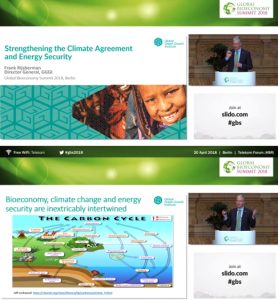
Dr. Frank Rijsberman, GGGI Director-General, delivered a keynote speech on Strengthening the Climate Agreement and Energy Security at the Global Bioeconomy Summit 2018 on April 20 in Berlin, Germany.
Is bioeconomy the problem or the solution? It has be either or both!
During his presentation, Dr. Rijsberman delved into the relationship between bioeconomy and climate change, and how agri-food systems are the primary driver of climate, water, soil and bio-geo-chemical cycles. He said that “We are not running out of resources, but the world risks exceeding planetary safe boundaries: climate change and biosphere integrity.”
He highlighted some of the challenges and opportunities of bioeconomy related energy and climate, pointing to the fact that the world urgently needs to pay greater attention to increased bioeconomy policy and research interest to address and tackle sustainability issues: climate change, energy security – as well as access to clean energy and related health concerns.
Dr. Rijsberman also made references to the recent GGGI study findings that revealed that estimated investment costs needed to meet the renewable energy NDC targets of GGGI’s Member and partner countries stand at US$260-800 billion.
Can modern bio-economy strengthen the climate agreement and energy security? There have been many proposed solutions – from carbon sequestration to biofuels –but progress is far from sufficient to limit CC to 2 degrees, let alone 1.5.
He emphasized that the world is not on track to achieve the SDG 7 renewable energy target. Share of renewables in power generation has grown to 25%, with solar/wind becoming the cheapest electricity in many countries.
To strengthen the climate agreement and energy security, GGGI is supporting governments to deliver on, and boost their commitments to emissions reductions in line with their Nationally Determined Contributions (NDCs).
Some of GGGI’s achievements in 2017 included helping countries to mobilize USD 524 million in green and climate finance to support developing countries achieve their green growth plans; supporting governments to develop green growth plans and policies and forging a strong strategic partnership with the Green Climate Fund.
While exciting bioeconomy advances are being made daily, this requires financing for innovation and developing countries may be left behind without the necessary resources for research and development.
GGGI is working closely with private sector and government through private public partnerships to boost capacity for innovation, development and implementation of bankable projects through policy development and financing arrangements.
The 2018 Global Bioeconomy Summit is expected to come up with a set of recommendations for national governments, regional bodies and international organizations to focus their national policies and technical, scientific and financial bioeconomy related cooperation activities.